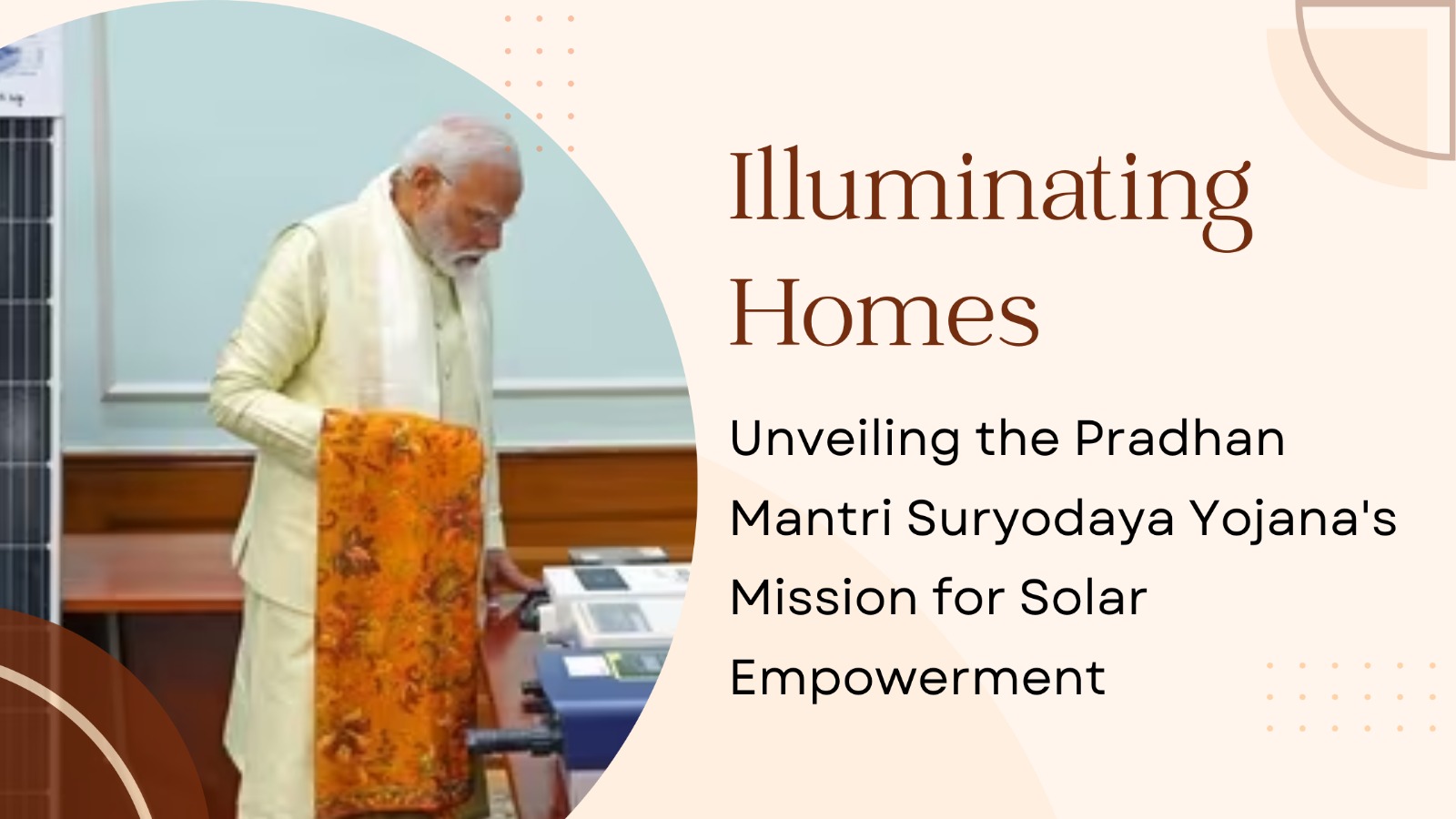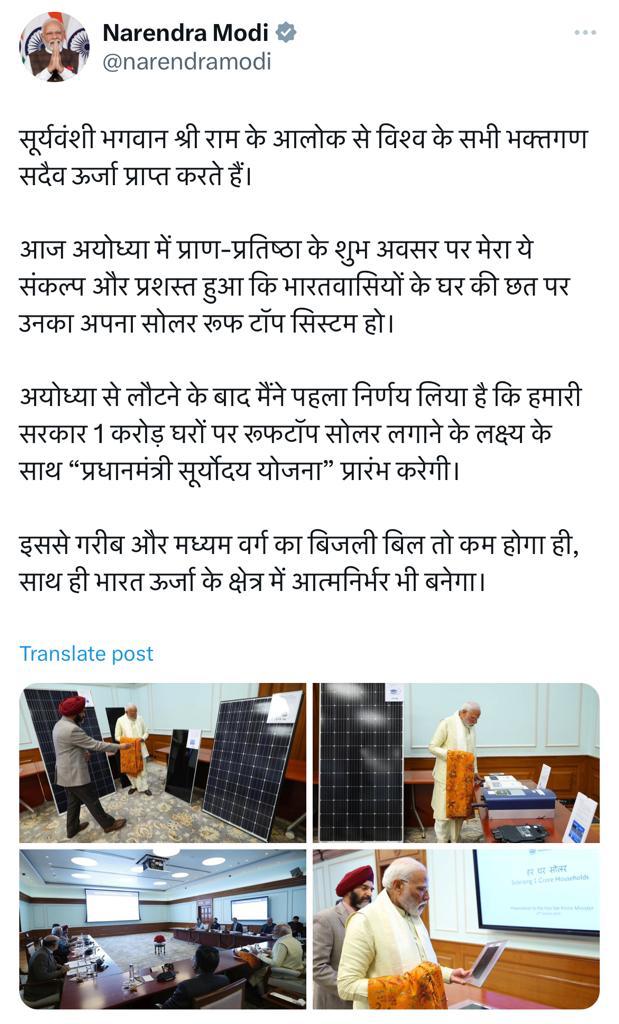
In a momentous and spiritually charged event, the consecration ceremony in Ayodhya marked not only a divine occasion but also fueled a visionary resolution for the people of India. Prime Minister Narendra Modi emerged from this sacred pilgrimage with a strengthened commitment to harnessing the power of the sun, symbolizing the Suryavanshi Lord Shri Ram.
The Prime Minister’s resolve to kickstart this expansive project underscores his belief that harnessing the power of the sun, much like the light of Suryavanshi Lord Shri Ram, can be translated into pragmatic and sustainable energy solutions for the people of India.

An ambitious goal of the “Pradhanmantri Suryodaya Yojana” is to equip one crore homes nationwide with rooftop solar power installations. This calculated action could save the impoverished and middle class’s electricity costs while propelling India to the forefront of the world energy market.
“Renewable Energy stands as a cornerstone for the nation’s progress, and its strategic utilization is pivotal. As an advocate for the circular economy and sustainability, I appreciate the visionary policy set forth by our Honorable Prime Minister, Narendra Modi ji. Under his powerful leadership, India has already demonstrated significant strides in renewable energy, Sustainable Development Goals (SDGs), waste management, and climate action. The introduction of the ‘Pradhan Mantri Suryodaya Yojna’ is poised to accelerate the manufacturing sector, generating temporary employment opportunities, and fostering widespread adoption of renewable energy resources. Notably, millions of households have adorned their terraces, balconies and entrances with Indian National Flags and the Lord Ram flags in recent years. Now those millions of homes will also have solar panels and this will boost our economy, our consumer behavior, manufacturing and environment sustainability. Corporates might also align their ESG and CSR with this policy. Narendra Modi ji has etched a sustainable legacy of growth through his transformative leadership, leaving an indelible mark on the trajectory of our nation’s development.” – PR and Public Policy Expert, Mr. Devesh Purohit, CEO, Legacy Matrix.
After returning from the temple town of Ayodhya, where he participated in the consecration ceremony of Lord Ram Lalla at the newly built Ram Janmabhoomi temple, the decision was made by Prime Minister Modi to launch the ‘Pradhan Mantri Suryodaya Yojana.’ He shared images of discussions about the scheme with officials during his visit.
Here are the key points of the ‘Pradhan Mantri Suryodaya Yojana’:
1. The scheme aims to provide rooftop solar panels to one crore households, ranging from poor to middle-class, in an effort to supply electricity through solar energy.
2. Prime Minister Modi emphasized that the scheme would not only reduce electricity bills for the poor and middle class but also contribute to India’s self-reliance in the energy sector.
3. Business Today reported that the Prime Minister urged officials to initiate a nationwide campaign, encouraging residential consumers to adopt rooftop solar on a large scale.
4. Rooftop solar panels, installed on building roofs and connected to the main power supply unit, reduce reliance on grid-connected electricity, resulting in cost savings for consumers.
5. Solar rooftop systems involve upfront capital investment and minimal maintenance costs.
As of December 2023, India’s solar power installed capacity is approximately 73.31 GW, with rooftop solar capacity at around 11.08 GW. The National Rooftop Scheme by the Centre offers financial assistance, covering 40% of the capital cost of a solar rooftop project. In 2014, the union government launched the Rooftop Solar Programme, targeting a cumulative installed capacity of 40 GW by 2022.
“The recent announcement of “Pradhan Mantri Suryoday Yojana” is a positive one for the solar industry as a whole. PM Modi’s latest scheme of installing rooftop solar in one crore houses is certainly ambitious as it would cover 10 GW out of the 40 GW rooftop solar capacity addition target, which the MNRE has laid out till March 2026. Though the guidelines are yet to be issued, the Rs. 1,20,000 crore that REC ltd. will lend to 8 central PSUs under the scheme will help the adoption of solar in a major way, as one of the biggest constraints in regards to adoption of Rooftop Solar is the high initial costs. Rooftop Solar has been lagging compared to Utility Scale Solar, which have caused a hindrance in India’s path to energy transition to achieve its Net-Zero emissions target. This scheme will give Rooftop Solar in India a boost in a major way.” – Mr.Gautam Mohanka CEO , Gautam Solar
The “Pradhanmantri Suryodaya Yojana” is emphasizing on the common man is one of its main benefits. The government wants to directly improve the lives of the poor and middle class by putting solar rooftop systems on the roofs of one crore homes. Because their electricity costs are lower, these households will have more money available to them, which will enhance their standard of living.
This programme bridges the gap between the rich and the poor and is in line with the government’s commitment to inclusive and sustainable development.
It is impossible to overestimate this initiative’s environmental impact. India makes a significant advancement in lowering its carbon footprint by switching to solar energy. When compared to conventional fossil fuels, solar power is a clean, greener option that drastically reduces harmful emissions and lessens the negative consequences of climate change.
The “Pradhanmantri Suryodaya Yojana” promotes India as an ethical and ecologically concerned country while cooperating with international initiatives to address climate change.
The effort is also critical to India’s energy independence and security. The need for energy is growing as the country’s economy expands. The government guarantees a resilient and diverse energy portfolio by encouraging solar energy use in homes.
Energy security is enhanced by the decreased reliance on conventional energy sources, which protects the country against outside shocks to the world energy market.
According to Mr.Rohit Tikku CEO , Bluebird Solar – “Bluebird Solar acknowledges the crucial role played by the Pradhan Mantri Suryodaya Yojana in advancing the cause of clean energy, particularly with its ambitious goal of solarizing 1 crore homes. The government’s provision of subsidies and essential financial assistance to qualifying solar projects is poised to facilitate broader adoption of solar power, enabling more families to get their own solar rooftop systems and curtail electricity expenses. We express a high level of optimism regarding this initiative and stand prepared to contribute by offering state-of-the-art solar solutions that align seamlessly with the scheme’s objectives.”
The announcement of the “Pradhanmantri Suryodaya Yojana” in Ayodhya not only marks a significant spiritual occasion but also opens up a plethora of opportunities for companies operating in the renewable energy sector. Among them, TATA Power, Gensol Engineering, Borosil Renewables, IREDA, Waaree, and Sterling & Wilson are poised to reap substantial benefits from this visionary initiative.
TATA Power, with its extensive experience in the power sector, is well-positioned to play a pivotal role in the implementation of rooftop solar power installations. The company’s expertise in renewable energy solutions and infrastructure development aligns seamlessly with the objectives of the Suryodaya Yojana. This initiative can potentially boost TATA Power’s market presence and contribute to its long-term sustainability goals.
Gensol Engineering, a company likely specializing in solar engineering and technology, stands to gain significantly from the surge in demand for solar power installations. As the government aims to equip one crore homes with rooftop solar power, Gensol Engineering could witness a surge in project contracts and partnerships, solidifying its position as a key player in the renewable energy sector.
Recognised for its proficiency in solar project engineering, procurement, and construction, Sterling & Wilson stands to gain from the nation’s growing need for solar systems. The Suryodaya Yojana’s audacious objective creates new opportunities for Sterling & Wilson to demonstrate its expertise and aid in India’s shift to sustainable and independent energy sources.
The “Pradhanmantri Suryodaya Yojana” is not merely a policy but a transformative vision for the future. It represents a harmonious blend of spirituality and pragmatism, leveraging the divine light of Ayodhya to illuminate the lives of millions.
As solar panels adorn the rooftops of homes across the country, India marches confidently towards a sustainable, self-reliant, and environmentally conscious future. The “Pradhanmantri Suryodaya Yojana” is not just a scheme; it’s a beacon guiding India towards a brighter and cleaner tomorrow.
Join 80,000+ awesome subscribers and update yourself with our exclusive news.







Leave a Reply